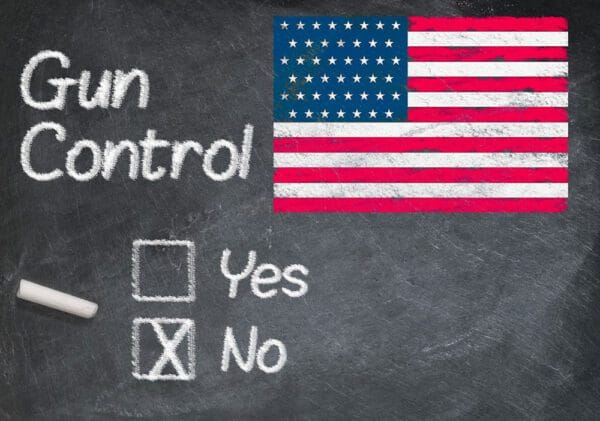
In any fight over constitutional rights, it helps to understand just what you’re up against, and when it comes to the Second Amendment, it’s not just anti-gunners but the media and the way things are reported that can make all the difference in how the public perceives the message.
For example, according to a report in the Missouri Independent, House Democrats gathered for a Monday “roundtable forum” on proposed changes to U.S. gun laws, and only a couple of paragraphs into the story, one could see there was evidently no room at this particular table for representatives from any of the nation’s gun rights organizations. Congressman Jamie Raskin (D-MD), a perennial anti-gunner, only mentioned the National Rifle Association in terms of groups pushing back against gun control, which the article described as “gun reform” or “gun safety legislation.”
The same report was published in the Louisiana Illuminator, and it pointed out that the March for Our Lives movement “advocates for gun control legislation at the state and federal level.
“Raskin was reportedly joined in this “roundtable” event by fellow Democrats Maxwell Alejandro Frost (Florida), Greg Casar (Texas), Dan Goldman (New York) and Eleanor Holmes Norton (Washington, DC). Apparently no Republicans were invited.
Long story short about the event and the coverage is that it was one-sided, with the gun control lexicon fully employed.
How would the media react if the NRA, Citizens Committee for the Right to Keep and Bear Arms, Gun Owners of America, Firearms Policy Coalition and Second Amendment Foundation held a “roundtable forum” concerning the continuing attack on the rights of gun owners, especially if it were chaired by Republican House members?
Meanwhile, ABC News is reporting that a recent poll by Quinnipiac University, taken in the days following the Lewiston, Maine mass shooting “found that 46 percent of registered voters worried about becoming a victim of a mass shooting themselves.” Pretty impressive, right?
Take a look at the Quinnipiac poll report, which puts this in a different perspective: “Forty-six percent of voters personally worry about being the victim of a mass shooting, while 53 percent do not.” (Emphasis added.) Translation: A majority of voters are not worried about being a mass shooting victim, but that was evidently not the message ABC News wanted to convey.
There was more to the Quinnipiac survey which seemed to escape media attention. Chief among the survey revelations which were probably overlooked was the stark differences between Democrats, Republicans and Independents on the question of banning so-called “assault weapons.” Here’s what Quinnipiac reported:
“Democrats 89 – 10 percent support a ban on the sale of assault weapons, while Republicans 75 – 21 percent oppose it. Fifty percent of independents oppose a ban, while 45 percent support it.” Translation: Democrats are gun prohibitionists, Republicans come down on the side of gun rights, and they are joined by a slight majority of Independents.
Quinnipiac did report that 53 percent of voters “think the United States would be less safe if more people carried guns, while 39 percent think the United States would be safer if more people carried guns, very similar to a June 2022 Quinnipiac University poll.”
Gallup’s survey concluded, “Today’s partisan differences on guns contrast with relatively modest gaps two decades ago.” The veteran polling firm drew attention to three significant points:
- In 2001, 61% of Democrats and 44% of Republicans wanted gun laws to be stricter. Since then, there has been a 27-percentage-point increase in the percentage of Democrats favoring stricter laws and an 18-point decrease among Republicans. Independents’ views haven’t changed.
- Compared with 2000, the percentage of Republicans in favor of a handgun ban has fallen 19 points. Democrats’ and independents’ views on this issue are generally similar to what they were in 2000.
- The percentage of Republicans who think guns make homes safer has nearly doubled since 2000, from 44% to 86%. Independents also show a large shift in the same direction, from 36% in 2000 to 66%. Democrats are slightly more likely today (37%) than in 2000 (28%) to think guns make homes safer.
The Gallup survey also looked at gun ownership and found that 44 percent of U.S. adults acknowledge having a gun in the home “or on their property.” Of those, 30 percent own the gun personally, and the rest say the gun belongs to a “household member.” These percentages have remained fairly steady for several years.
Narrowing things down a bit—which you probably didn’t see reported by any major news organization—Gallup found that “Gun ownership rates have increased among Republicans over the past two decades,” while “Democratic gun ownership has declined slightly.” The survey said 45 percent of Republicans personally own a gun, and 58 percent live in a household with guns. On the other hand, only 18 percent of Democrats say they personally own a gun, and only 29 percent live in a household where someone else owns a gun. Among Independents, 29 percent personally own guns, and 43 percent live in a “gun household.”
One might argue that if these numbers were more prominently reported by the media, it would explain why Democrats routinely support more gun control while Republicans are more resistant.
It might also provide more guidance to voters about who they should support in future elections.
About Dave Workman
Dave Workman is a senior editor at TheGunMag.com and Liberty Park Press, author of multiple books on the Right to Keep & Bear Arms, and formerly an NRA-certified firearms instructor.

from https://ift.tt/FMvSBOD
via IFTTT

No comments:
Post a Comment